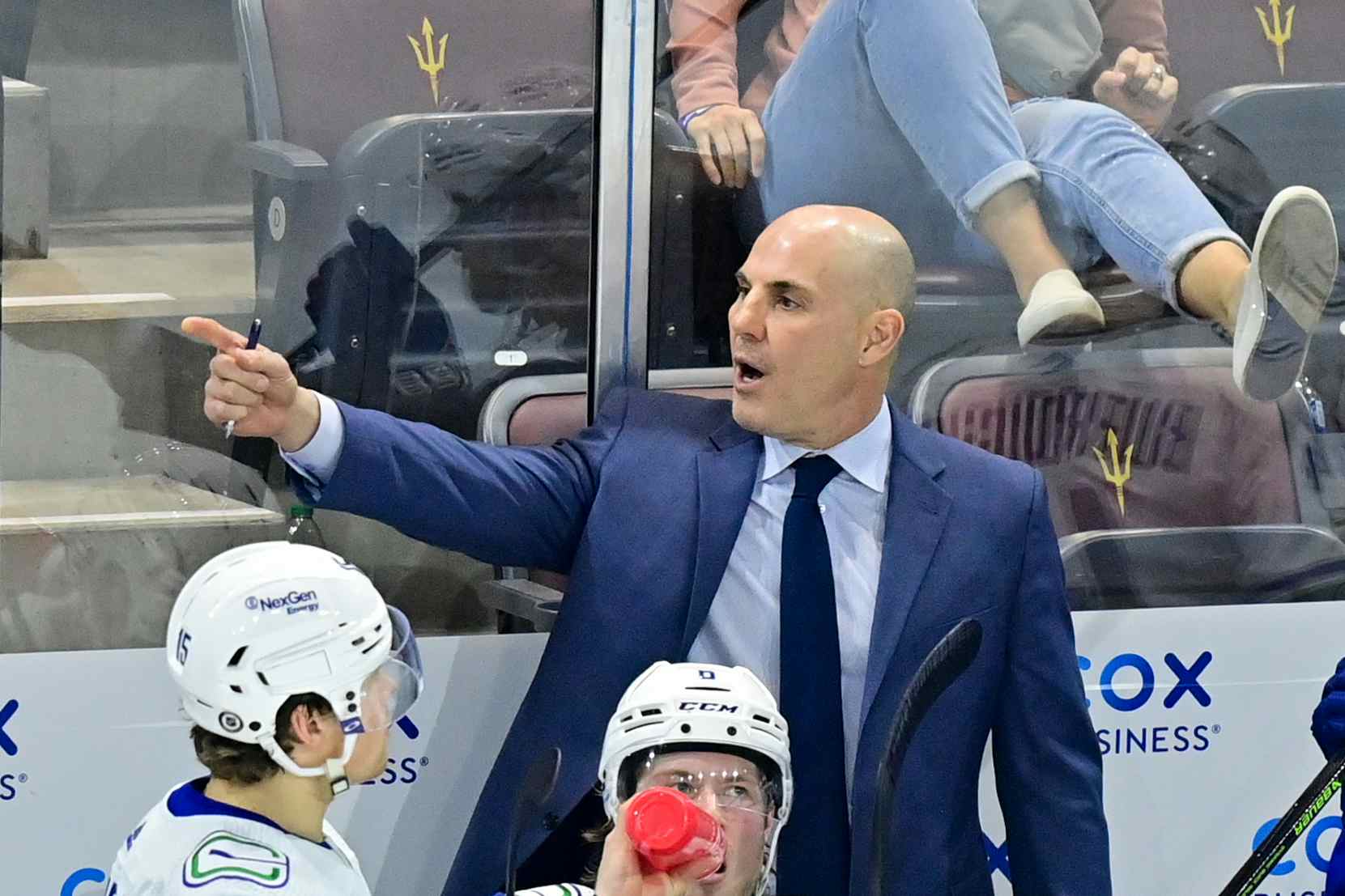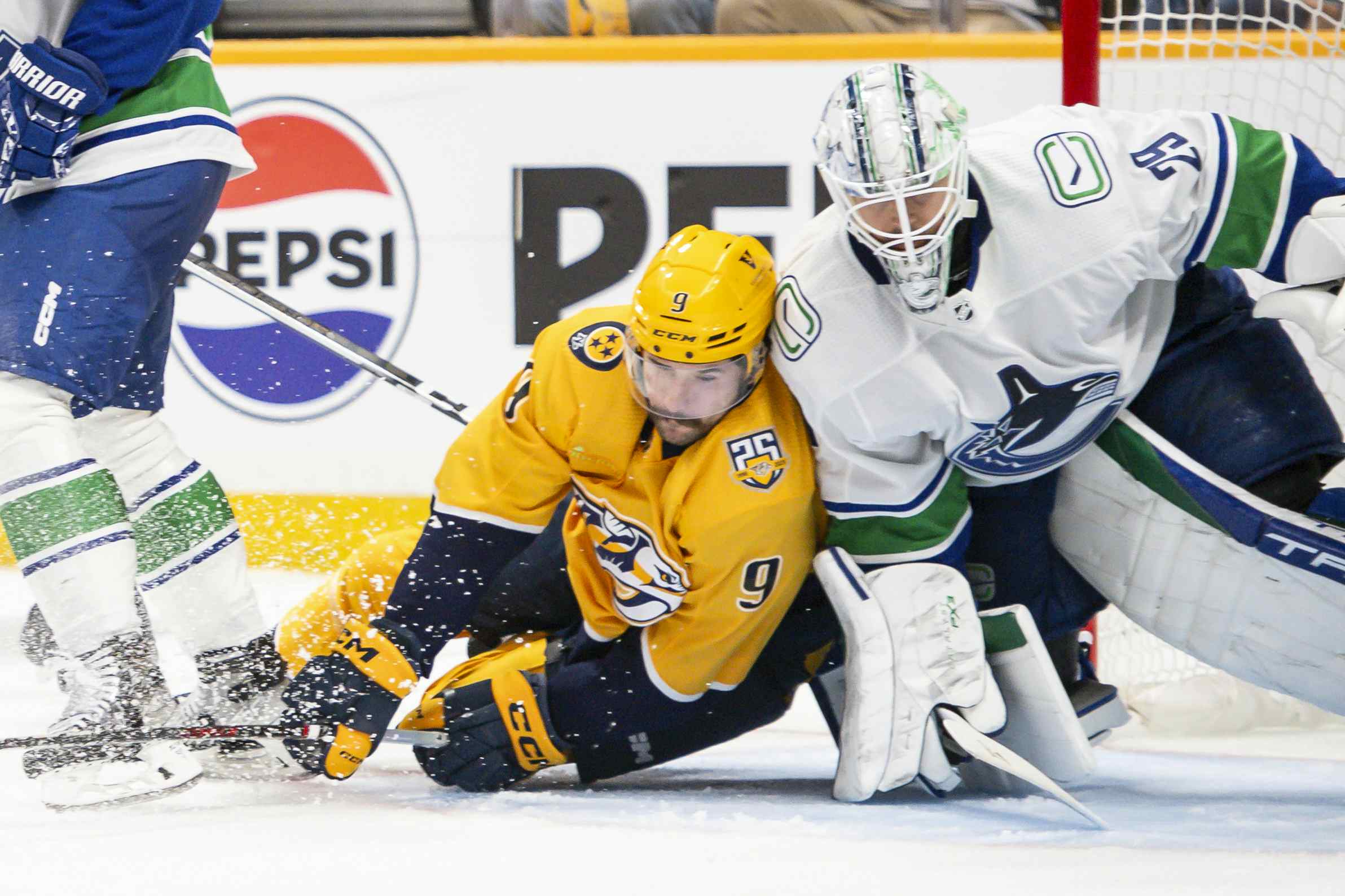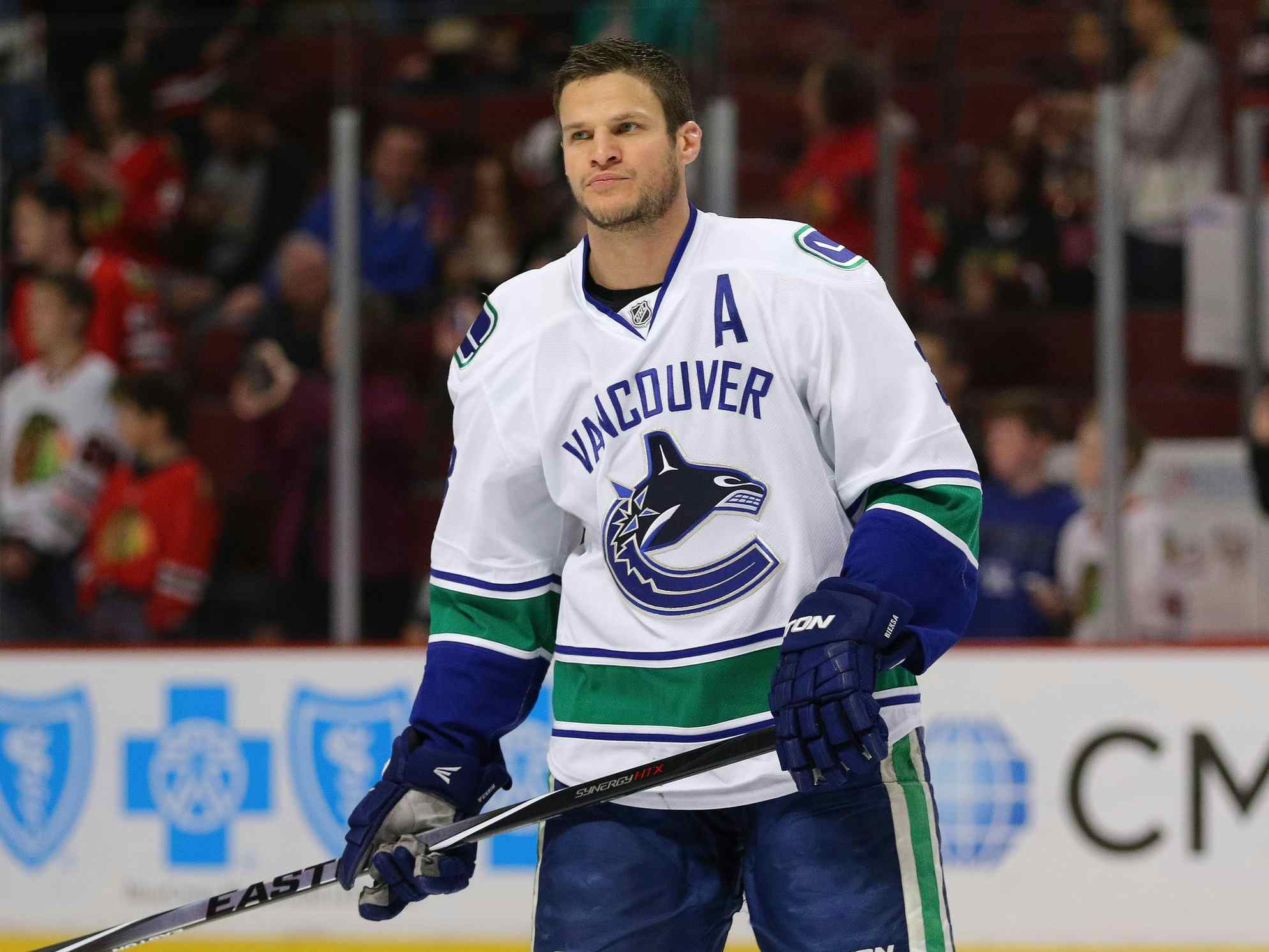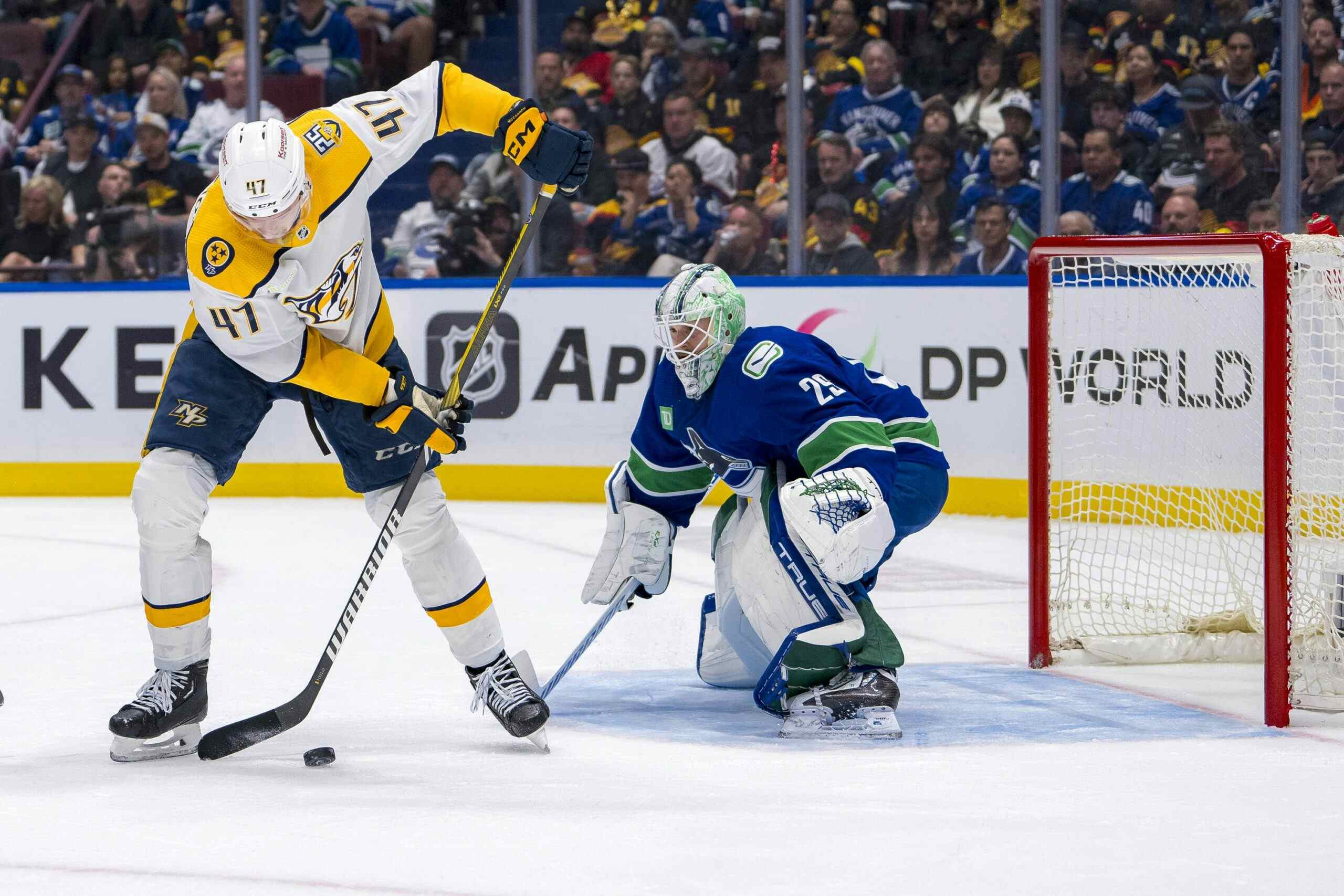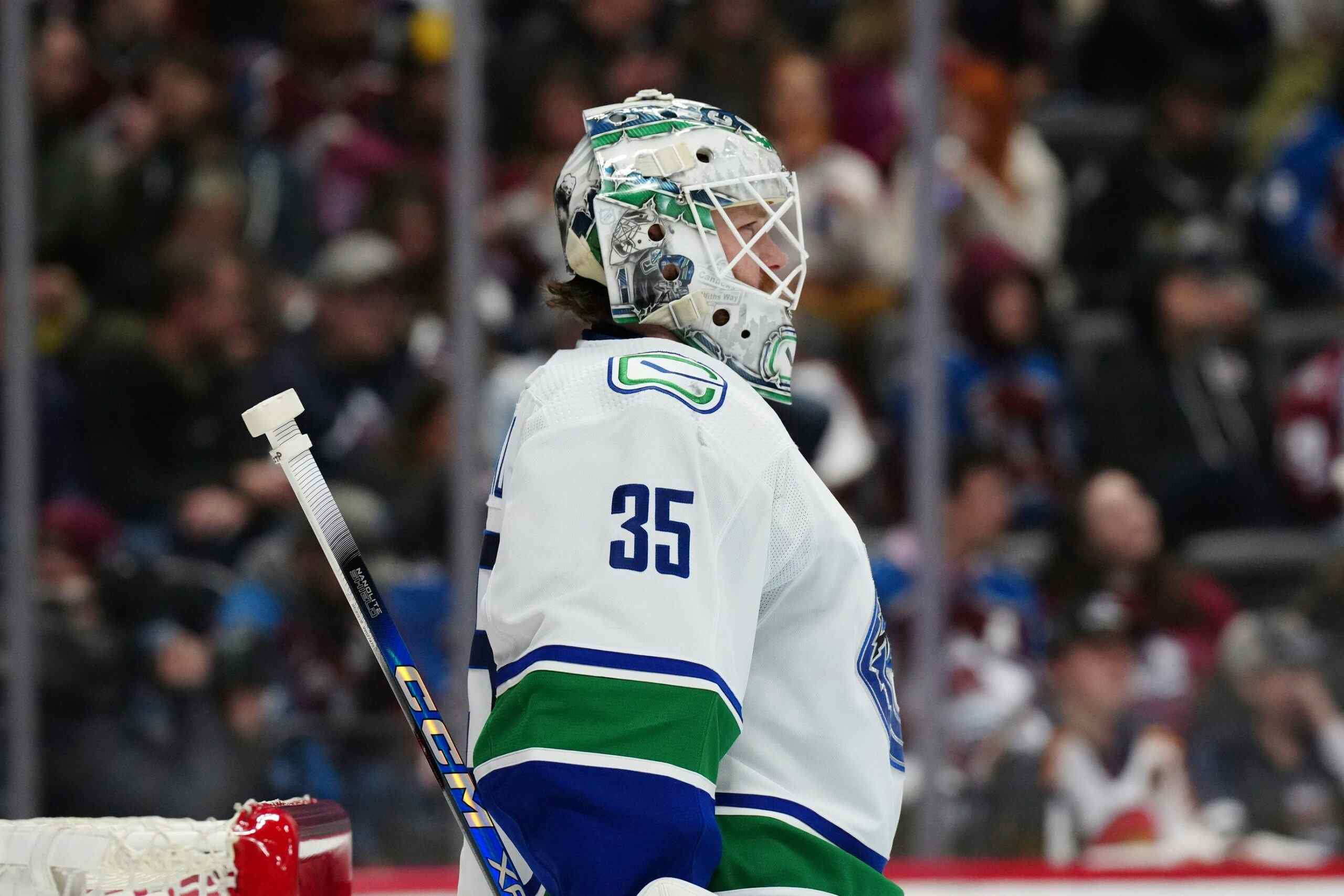In Suter’s Wake, the Canucks Acquiring Shea Weber Remains a Farfetched Pipe Dream
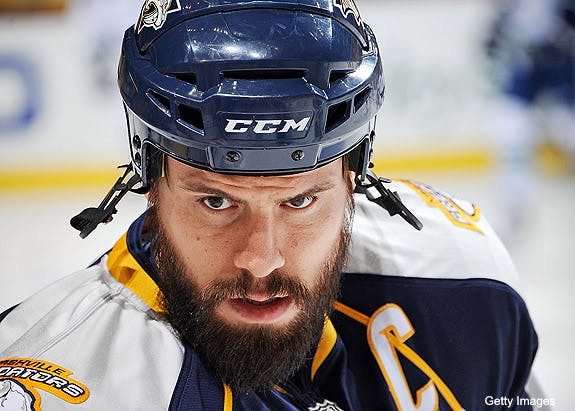
Dan Hamhuis is pretty much the least sexy player in the entire NHL. He has an under-stated two-way game, and he puts up points, but he does so as quietly as a mouse on Christmas Eve. Still, he gives your average Canucks fan a raging hard sea-to-sky boner.
Quebec has their goaltenders, Ontario produces elite forwards seemingly off of an assembly line, and while the West may not be an "enforcer factory," British Columbia does have a nice history or producing elite NHL defenseman.
Scott Niedermayer is actually from Alberta, but British Columbian hockey fans are convinced he’s a "BC boy." Counting him, Brent Seabrook, Duncan Keith and Shea Weber – you have more than half of Canada’s 2010 Gold Medal winning Olympic blueline hailing from the country’s westernmost Province.
For hockey fans from the west coast, there’s a pride and a mystique that surrounds the "BC-born defenseman." Over the last decade that mystique has co-mingled with a sense of frustration and resentment borne out of the fact that a truly elite 1A d-man has never played for the Canucks franchise.
"We produce so many great defenseman in our own backyard, why can’t we get them on the team I root for?" Asks Joe Canucksfan from Vernon, British Columbia – speaking for the whole damn Province. As a result of this popular notion, even relatively unproven commodities like West Kelowna’s Justin Schultz, or White Rock’s Jason Garrison will drive Canucks fans into paroxysms of hysteria. So, imagine how Vancouver’s hockey fans react to the notion of Shea Weber – arguably the most dominant single defenseman in the league – wearing the blue, green and white?
On Wednesday, the Predators lost Ryan Suter, a blue-chip defenseman in his own right, to unrestricted free-agency and the Minnesota Wild. They’d kept Suter on the team past the trade-deadline, and they didn’t trade his rights at the draft, all in a desperate effort to re-sign Shea Weber’s long-time defensive partner. Now, Predators General Manager David Poile is left at the altar, down one elite defenseman, paying a goaltender 7 million dollars for the long-term, and uncertain about the future of captain, and franchise cornerstone Shea Weber, who is reportedly distraught about Suter’s departure.
Does Suter’s departure open the door for the Canucks to take a serious run at Shea Weber? Maybe, but do the Canucks really have the assets to make a deal happen? Should they try a predatory offer-sheet? It’s a tantalizing mixture to think about, but the prospect of Shea Weber in a Canucks uniform remains an extremely farfetched pipe dream. Let’s get into why.
A Lesson Learned?
The first relevant question that we have to ask is, will Predators General Manager David Poile – who gambled, and was burned pretty badly by Suter’s departure – risk losing a piece like Shea Weber for nothing? Or will he be more proactive this time around?
Based on Wednesday’s comments to Joshua Cooper of the Tennessean, Poile sounds like a man with a directive: "do everything you can to re-sign the face of this franchise." Here’s his quote:
“Our attention turns to our captain Shea Weber and the player we want to build our franchise around and see if we can talk to he and his representative about a longer term contract with the Predators."
Shea Weber is a restricted free-agent again this summer, he was an RFA last summer as well, and was awarded 7.5 million at team elected arbitration.
For the most part, it has seemed as if Weber has been in a holding pattern regarding his current team – waiting and watching to see if the small market Predators, a model franchise for most of their existence, could demonstrate the wherewithal to transform their ragtag group into a serious contender. One has to think that the departure of his long-time partner, and friend Ryan Suter damages Nashville’s chances at retaining one of the best defenseman in the game.
If Nashville General Manager David Poile decides to move Shea Weber this summer, correcting the mistakes he made by allowing Hamhuis and Suter to walk for nothing, what would he be looking for in return? A massive package, is the obvious answer. You’d have to think the asking price in a prospective Shea Weber trade would have to include a couple of roster players, at least one elite prospect, and several first round draft picks. There would be many, upwards of twenty probably, teams lining up to make their best possible offer, and that will drive up the price even further.
Do the Canucks have the assets to make a competitive offer? Maybe. Start the bidding at Alex Edler (or Keith Ballard, if Nashville would prefer a defenseman with term remaining on their deal), Chris Tanev, either Jannik Hansen or Zack Kassian, Nicklas Jensen and a couple of first round picks. Even so, that offer would pale in comparison with what the likes of Edmonton (a package based around either Jordan Eberle or Taylor Hall), Philadelphia (Coutourier, Read, Coburn) or New York (McDonnaugh, Del Zotto, Kreider, Dubinsky) could offer. In short, if Poile decides to move Shea Weber this summer, the Canucks are probably not going to be in a position to make a competitive offer.
That is unless Mike Gillis manages to absolutely hose Dale Tallon or Brian Burke on a potential Luongo deal, but it’s tough to see that happening…
Nashville’s Quiet Leverage
With the current CBA expiring this September, it’s possible that many of the things that come with it – most importantly the current number of "years accrued" before a player hits unrestricted free-agency (7), or the ability teams have to offer players "life-time contracts" – could come to an end. Quietly, that uncertainty is Nashville’s best bargaining chip.
Shea Weber could be leaving millions, and I don’t mean several millions, I mean upwards of fifty million dollars (US) on the table should he go past September 15th without a long-term deal in place.
Consider the possibilities. Say Shea Weber signed a long-term deal this season, let’s go with 13 years at an average cap-hit of 9 million (not a stretch), that would be worth 117 million dollars over the duration of the deal. If term is capped at six years in the new CBA (which, many expect it will be) and Weber signs a deal worth 11 million per season – he’s just lost 51 million dollars! That’s a fair bit of coin.
If Shea Weber tries to force his way out of Nashville this summer, Poile’s best play is to refuse to budge. After all, that refusal could well prove to be a disaster for Shea Weber’s bank account. Every day between now and September 15th that Shea Weber doesn’t ink a long-term deal, he incurs a sizable opportunity cost and that fact strengthens Poile’s footing.
The Dream of a Predatory Offer Sheet
What we discussed above regarding Nashville’s quiet leverage, also explains in part why a one year offer sheet to Shea Weber doesn’t make any sense. Put simply, I can’t fathom why he’d ever sign it.
The benefit of signing Shea Weber to a one year offer sheet for a team like the Canucks – who don’t have the assets to make a competitive trade offer for Nashville’s dominant blue-liner – is that if Nashville matches, they can’t trade him for twelve months. Essentially, if the Predators don’t match you get Shea Weber, which is awesome, and if they do then at least you’re ensuring that the Predators lose Weber for nothing, and that you’ll be able to take your best shot at him on July 1st, 2013.
But signing a one year offer sheet doesn’t make sense for Weber. If Weber’s sole priority was maximizing his payday, then he’d already be working on signing a long-term deal with Nashville this summer. If his priority was that he wanted out of Nashville at any cost, then maybe he’d sign a one year offer-sheet – but that seems like an extraordinarily unlikely scenario.
More likely, the truth lies somewhere in the middle. My hypothesis is that Weber doesn’t "want out of Nashville" so much as he’s unconvinced that they can support a juggernaut contender and at least wants to keep his options open, but he also wants to get paid. So it’s a priority balancing act – you want to make money, and you want to be somewhere where you have a chance to win multiple Stanley Cups. If this is the case, then Weber’s best bet is to drag his feet on signing any deal with the Predators, do what he can to force a trade before September 15th, then sign long-term with the team that trades for him. Signing a one year offer sheet would severely limit Weber’s options, which, is why I think it’s a fairy tale scenario.
While Poile is between a rock and a hard place at the moment, the nature of restricted free-agency and the particular restraints placed upon Shea Weber’s camp by the current atmosphere of uncertainty, means that the Predators embattled General Manager is still driving this bus. It’ll be fascinating to see how Poile, Weber, and 20+ NHL teams interested in trading for the defenseman play their cards over the coming months – but whatever happens, it seems structurally probable that the Canucks will be on the outside looking in…
Recent articles from Thomas Drance

